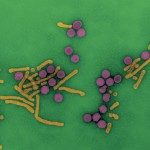Link to Pubmed [PMID] – 10698519
Oncogene 2000 Jan;19(4):498-504
Wnt/beta-catenin signaling is frequently activated in cancer cells by stabilizing mutations of beta-catenin or loss-of-function mutations of the APC tumor suppressor gene. We have analysed the role of beta-catenin in the pathogenesis of hepatoblastoma (HB), an embryonic liver tumor occurring mainly in children under 2 years of age. Sequence analysis of the beta-catenin NH2-terminal domain in 18 epithelial and mixed HBs revealed missense mutations in the GSK3beta phosphorylation motif or interstitial deletions in 12 tumors (67%). In the remaining cases, no truncating mutation of APC could be evidenced. Immunohistochemical analysis of beta-catenin in 11 HBs demonstrated nuclear/cytoplasmic accumulation of the protein in all tumors analysed, with predominant nuclear beta-catenin immunostaining in undifferentiated cells. Membranous beta-catenin localization was preserved only in fetal-type tumoral hepatocytes and was associated with E-cadherin expression. Moreover, we show that beta-catenin is aberrantly overexpressed in a large spectrum of tumor components, including hepatocyte-like cells at various differentiation stages and heterologous elements such as squamous, osteoid and chrondroid tissues, and in occasional other mesenchymally-derived cells. These data strongly suggest that activation of beta-catenin signaling is an obligatory step in HB pathogenesis, and raise the possibility that it interferes with developmental signals that specify different tissue types at early stages of hepatic differentiation.

